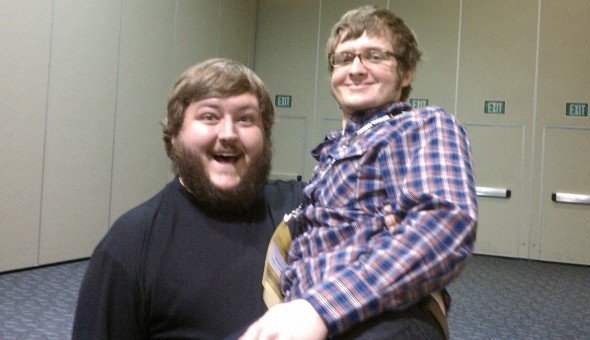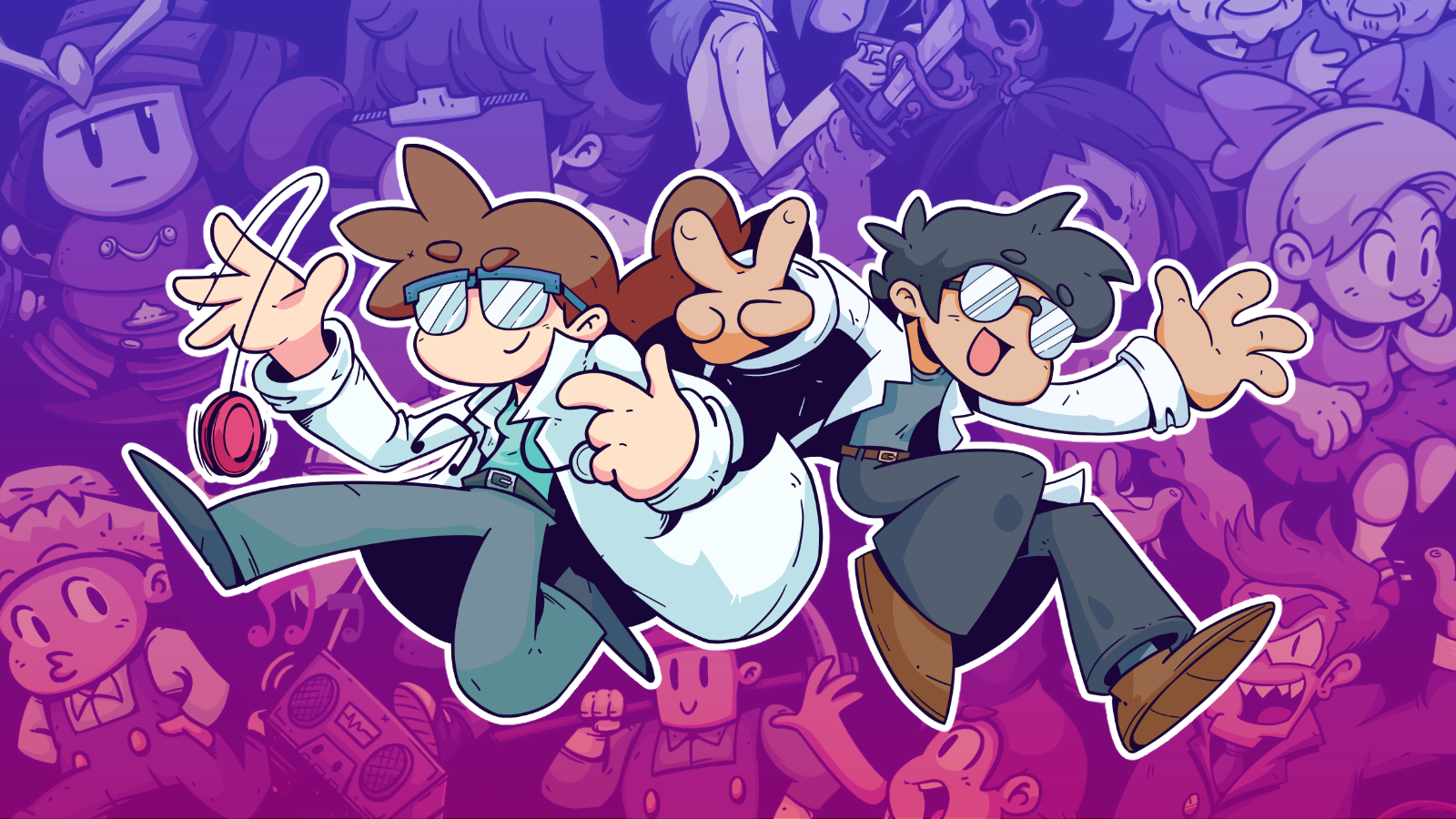Behind the music: an interview with Super Meat Boy composer Danny Baranowsky
DB: Katamari Damacy, Plants vs Zombies. I was playing Super Mario Galaxy for the first time about a month ago and that was awesome. I am kind of disappointed that Final Fantasy has gone downhill so badly. Final Fantasy X was the last one with decent music, and IX was the last with great music.
I do think there seems to be a little too much cynicism when it comes to videogame music, in that a lot of people are like: games like Call of Duty and the big epic games like that or games that require an ambient soundtrack, just because it isn't melodic or you can't listen to it in your car doesn't make it bad music. I think some people equate good music with super-poppy melodic stuff and to me it's more about what serves the game. I don't think it's as bad as a lot of people say. I hear a lot of, "game music isn't what it used to be," but I think it's our expectations that have changed a lot. It isn't like in the '80s, where all you had was four channels and the games were so simple that the music was a huge part of it. Uncharted 2 has a great soundtrack, Greg Edmonson is awesome, but the dialog is a huge part of that game. There wasn't dialog 20 years ago.

EL: It really seems like a modern challenge, with how much context matters in game music. Like, on the one hand, context should matter in the game because that's part of building a good song, it has to fit the theme or the level or the art. But at the same time, as a composer, are you still hoping that your songs can stand on their own so people don't need to know that “this the theme that they played when Aeris dies” for it to be meaningful to them?
DB: Yeah, totally. One of the examples that comes to my mind—did you ever see The Shield? The show?
EL: Just an episode, I think.
DB: I loved that show. And it had absolutely no music. And it was awesome. Being someone who writes music for a living, you'd that would bother me, but it doesn't. I guess why that sticks with me is: game music does not always have to be incredible art—it can just be complimentary to something else. I'm lucky in that way…Super Meat Boy left room for ridiculous synth solos and just…bombastic s$*#. It was a ton of fun to make. That wouldn't be the same in Fallout. You aren't going to hum any melodies for Fallout, but that doesn't mean that music wasn't f*#$ing perfect for it, like dead-on.
EL: Can you talk a little bit more about how Edmund got in touch with you?
Keep up to date with the most important stories and the best deals, as picked by the PC Gamer team.
DB: Edmund knew me through Adam, and he had seen Gravity Hook and some other stuff. When they contacted me for the original Meat Boy, there wasn't time for a soundtrack, so he said “Just send me what you have lying around." So I sent him like 12 random tracks, and he somehow made a reasonably cohesive soundtrack. That was the original Meat Boy. For Super Meat Boy, I put those tracks into it. The Main Theme, the Forest music, the Salt Factory music and the Rapture music—all of them are from the Flash game. That was cool in that it was so meta at that point. I was remixing my own videogame music.
It's really cool to have people like Adam and Edmund. Everything they let me do, they let me write for it. I don't have to go out and look for tons of gigs—everything they do, I love, and it's awesome. Adam and Edmund and Tommy all appreciate how important game music is. You can't really ask for more than that.
EL: Are there any other composers out there that you really like? Mainstream, chiptunes, etc.?
DB: For chiptunes, my favorite artist right now is Disasterpeace --
EL: Yeah!
DB: --Rich Vreeland. I met him last night for the first act [at GDC]. He's amazing. He makes chip music sound far more…varied than it has any reasonable ability to be. With such a limited set of sounds he does such ridiculous things.
EL: Yeah. His stuff is very rarely, like…saccharine, in the way that, like Anamanaguchi might do, or something. It doesn't feel Japanese.
DB: Anamanaguchi is really good. I don't say this to be down on them or anything, but when it comes to chiptunes artists, I don't know if “it bugs me” is the right phrase, but what doesn't interest me is when people make club music with chip sounds. It's kind of like the whole hipster thing, where they're co-opting the nerd look. It's like, hey--I got the nerd look by being a nerd. So I'm not saying it's not genuine or whatever, it's just doesn't interest me to hear music that would be a club track with chip instruments. That's why I love to hear what Rich does because he does just crazy, original compositions with these sounds we loved growing up. Anamanaguchi is awesome, those guys are fun to listen to, and the Scott Pilgrim game soundtrack was awesome but—y'know, we all have to have preferences, I guess. [laughs]
EL: Are you satisfied with the recognition that game music has?
DB: I think it's important to understand the difference between chiptune and game music. Because when people say a videogame soundtrack is a chiptune, that's kind of strange to me. The retro tracks are chiptunes—they're the chip instruments and everything—but the latter half of the game is all orchestral music, those definitely aren't chiptunes.. I understand why because people don't have on top of their mind at all times the distinctions between types of game music, so I know why I'd be more cognizant of it. But, y'know, my parents—when they hear any chiptune, you could play them Stairway to Heaven in chiptune and they will think it's noise. I think it sounds awesome. But it kind of parallels the acceptance of games. Games are becoming more accepted and I think game music is too. Films have been around 100 years—would you say film music is accepted in mainstream? Probably not. I mean, people buy soundtracks, but only when it's the full club cut of the Rob Zombie song from the movie, or something. If we get too hung up on the recognition I don't know if that's really healthy on the creative side. It is cool to have people into it and have a big audience and everything. I guess one of the things that's interesting is that I heard a Katy Perry song where she used a Game Boy sound in it, and that's cool. It's cool that it's crossing over. Part of what's helping that acceptance is that the people who grew up with those sounds are consumers now.
And will it ever be as big as regular music? I don't know, I don't really think I care, they're different genres, which is strange because game music isn't a genre, it's just a thing, and there are as many genres in game music as in anything else.
Listen to music from Super Meat Boy at meatboymusic.com . Danny's other work can be heard at dannybmusic.com . Follow Danny on Twitter here .

Evan's a hardcore FPS enthusiast who joined PC Gamer way back in 2008. After an era spent publishing reviews, news, and cover features, he now oversees editorial operations for PC Gamer worldwide, including setting policy, training, and editing stories written by the wider team. His most-played FPSes are Hunt: Showdown, Team Fortress 2, Team Fortress Classic, Rainbow Six Siege, and Counter-Strike. His first multiplayer FPS was Quake 2, played on serial LAN in his uncle's basement, the ideal conditions for instilling a lifelong fondness for fragging.

